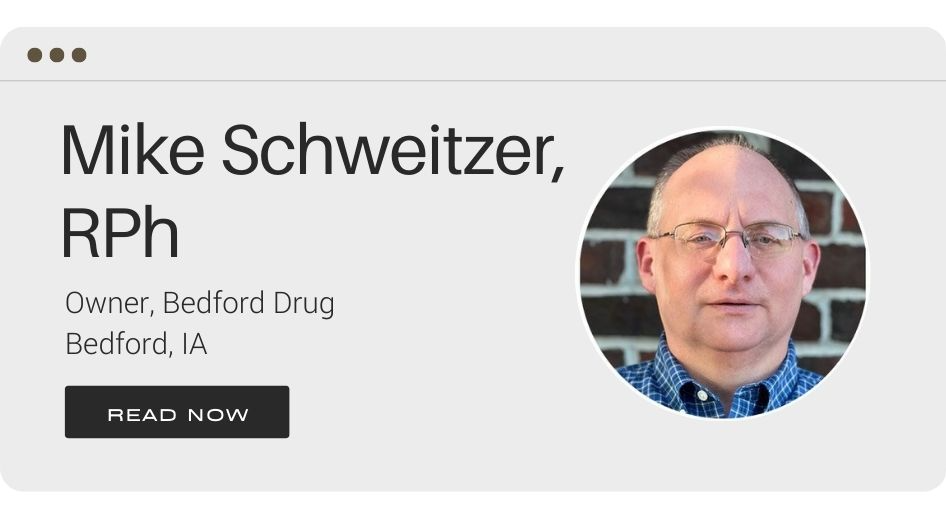Positioning the importance of your pharmacy through advocacy and personalized patient care
“If you try to practice pharmacy the way it was done 20 years ago, or even ten years ago, chances are you probably won’t be around for long,” said Michael Schweitzer of Bedford Drug in Iowa.
Bedford Drug is often the first place people come to for healthcare opinions. Schweitzer’s father started the store in 1965 and, at the time, there was no pharmacist in town. Schweitzer worked at his father’s store as a child, sweeping the floor and helping with deliveries. After graduating from high school, he went to pharmacy school and interned at his father’s store during summer breaks. In 1989, Schweitzer returned to the store as a full-time, credentialed pharmacist. He’s been there ever since.
Understanding their role in healthcare
In 2020, he realized the importance of his pharmacy. It immediately became a source of vaccine information — not only for their customers, but also for area physicians, clinics and public health agencies. Nearly everyone in the area turned to them and, before long, they worked closely with physicians’ offices to develop collaborative practice agreements.
“These were the types of things we were looking for, for our future,” Schweitzer said. Realizing that his pharmacy was becoming an integral cog in the vaccine and healthcare wheel, he yearned for more.
Schweitzer explains that years ago, when physician practices were physician-owned, Bedford Drug had a better relationship than it did when practices went to corporate ownership. Previously, the physician would call the pharmacy to share their patient’s condition and medications. It was a collaborative, conversational effort to decide mutually what was best for the patient.
As this transition from physician ownership to corporate ownership took place, Schweitzer realized that he was on his own — but he was not out.
Discovering new opportunities
He envisioned what he wanted for his pharmacy and realized that chronic care management is a void that he could fill in his area. He also began to monitor medication compliance. The issue was that the pharmacy wasn’t getting paid for it.
Schweitzer then connected with his local and state legislators to educate them on the independent pharmacy’s journey: what was needed, how it works, how they get reimbursed and paid, and more.
“The Iowa Pharmacy Association does a tremendous job of keeping us involved with what’s on the legislative front — telling us when we need to contact our elected officials. As a result, we’ve developed stronger relationships with them. Regardless of your political stance, these people are elected to represent you. They’re your only chance for change, and it’s time to start having a stronger voice. It’s time to promote what you do,” Schweitzer said.
He went on to say, “You should be paid for a service that you provide; the same service that a physician’s office is being paid for. It’s incredibly important to tell them what the problem is but offer a solution as well.”
The ripple effects
Schweitzer says that because he spoke up, his pharmacy offers even more services and healthcare management solutions than he ever dreamed possible. He went from sweeping the floors of his father’s store to becoming an advocate and a voice for his pharmacy — and it’s working.
He shares that doing their part to improve the quality of life is what makes his staff and him happy. Bedford Drug is now a part of a self-blood pressure monitoring program through the University of Iowa and the Iowa Department of Public Health.
In the program’s first year, a patient came in with high blood pressure reading. Schweitzer sent her directly to the doctor’s office, and she was immediately put on a substandard dose of blood pressure medication. When the patient came into Bedford Drug to have it filled, Schweitzer and his team worked with her to pick out the right blood pressure monitor and showed her how to use it and read the results.
That night, the patient went into hypertensive crisis and immediately headed to the emergency department, “just as we told her he should when he had an abnormal reading,” Schweitzer explained.
The patient returned home safe, sound and healthy. She let Schweitzer know that — because of him and his pharmacy — she now knows how to monitor her blood pressure at home, what the warning signs are and when she’s in the “safe zone” to go about her life.
“That was one save that I’ll never forget,” said Schweitzer. “It’s why we’re here. This is now our future.”







